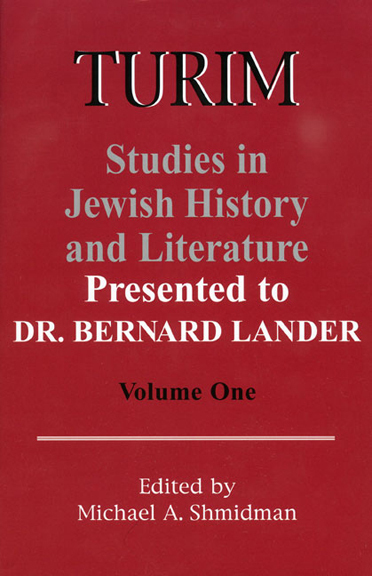A Literary Tribute to Rabbi Dr. Bernard Lander
The Kosher Bookworm
by Alan Jay Gerber
Issue of March 12, 2010/ 26 Adar 5770As we come upon the shloshim (30 days) of the passing of Rabbi Dr. Bernard Lander, I would like to bring to your attention a two-volume set of books published years ago in tribute to his career. Published by Touro College Press and Ktav Publishing House, this highly intellectual collection of essays is titled, “Turim: Studies in Jewish History and Literature,” and is edited by Dr. Michael A. Shmidman.Much has been written in recent weeks about Dr. Lander’s accomplishments. Therefore, with those articles as prologue, this essay will deal primarily with the particulars of this literary effort, in tribute to Dr. Lander’s life’s work.
Within these two volumes and styled in the religious and academic tradition of the Festschrift are a series of highly informative essays drawing upon a wide spectrum of Judaica related disciplines written by a who’s-who in Jewish academia.
Below will be detailed several of these learned offerings in the hope that your interest might be peaked into procuring this set.
Among the articles in volume one are works by Rutgers professor, Dr. Nachum Bronznick, dealing with Rabbi Samson Hirsch’s role as a Bible commentator, and former Harvard professor, Dr. Bezalel Safran, who writes about the Rambam’s take on pride and anger.
Touro dean, Dr. Moshe Sokol writes about Rabbi Joseph Soloveitchik’s take on human autonomy in the presence of G-d. My dear friend, the late Dr. David Kranzler, is author of an essay dealing with the actions of rabbinical confrontations with the War Refugee Board.
Dr. Judith Bleich details the controversy of bris milah in intellectual literature in Europe in the 19th century, and of the attempts to abolish its practice.
The second volume features part two of Dr. Safran’s essay as well as other essays by Yeshiva University’s Moshe Miller’s study on Rav Yaakov Emden’s attitudes toward Christianity and Touro’s Dr. Miriam Bodian’s study on Crypto-Jews in Iberia.
Rabbi David Shatz of Yeshiva University details his framework for the study of Ish ha-Halachah by Rav Soloveitchik.
Also to be found in this volume are essays dealing with such topics as the thoughts of Rav Hayyin Ozer Grodzinski by Touro’s Dr. Moshe Sherman, YU’s Dr. Hayim Soloveitchik’s take on the Torah writing’s of Rav Yehudah he-Hasid, and an interesting essay dealing with three student lists from the Volozhin Yeshiva in 1879, co-authored by Dr. Sid Leiman with Genrich Agranovsky, senior researcher at the Vilna Gaon State Jewish Museum in Lithuania. The historical background found here is a major contribution to European Jewish history.
Dr. Lander’s academic legacy was well-served in the publication of these works and I am certain that they gave him much personal satisfaction and pleasure.
The compilation of Festschrifts is, unfortunately, not as common today as in previous times. This laudable method of academic and religious tribute should be revived as part of a broader effort at enhancing the recognition of the academic studies and literary works of our rabbis and teachers.
This coming Monday, March 15th, the 29th day of Adar, marks the duel yarhtzeits of two very distinguished Jewish leaders of the previous generation. Rav Yaakov Kamenetzsky was one of the greatest rabbinic leaders of the post-war era of the 20th century whose wisdom and courage gave strength and organizational stamina to the Yeshiva Torah Vodaas and Beis Medrash Elyon. To this day, hardly a week passes by when somewhere a dvar Torah is written or spoken that contains Rav Yaakov’s wisdom.
We here in the South Shore have enjoyed for over the last half-century the leadership of his oldest son Rabbi Binyamin Kamenetzky. That tradition continues among us with the educational and literary leadership of his son, Rabbi Mordechai Kamenetzky.
Also on this same date is the yarhtzeit of Dr. Joseph Kaminetsky, the founding executive director of Torah Umesorah.
In that capacity “Joe” was responsible for the growth of the yeshiva and Jewish day school movement during the mid and late 20th century. His firm leadership and perseverance against much adversity was responsible for the success of these educational initiatives. He was directly responsible for the establishment of many Orthodox schools and shuls in areas of the United States that had previously been barren of Torah learning and worship.
In our community his grandson, Rabbi Yisrael Kaminetsky continues that leadership tradition as the high school menahel (principal) at the Davis Stahler Renov Yeshiva High School for Boys.
Some year’s ago The Shaar Press published Dr. Kaminetsky’s “Memorable Encounters: A Torah Pioneer’s Glimpses of Great Men and Years of Challenge”.
Within this book are detailed, first hand, the exciting times and activities that Dr. “Joe” experienced in interaction with some of the greatest American Jewish leaders of that era.
While out of print now for some time, it can be found online and in many libraries.

 52.0°,
Light Rain Fog/Mist
52.0°,
Light Rain Fog/Mist 




